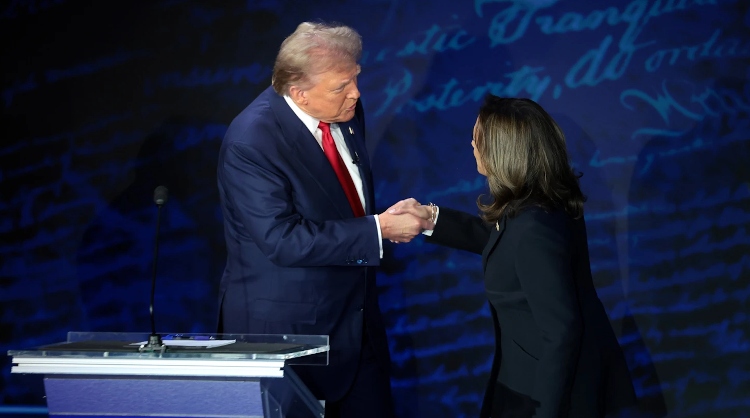As the 2024 U.S. presidential election approaches, set to begin on Tuesday, 5 November, Arab Americans are navigating a complex political landscape.
The upcoming election is critical for Arab Americans, as the winner will craft the country’s civil rights, immigration, foreign relations policies. Current crises, including conflicts in the Middle East — namely the Palestine-Israel war — and domestic economic instability, which amplifies the urgency of voters’ choices.
The candidates’ proposed policies (Presidential Plans) could reshape key issues for the community, while a growing awareness of the need for representation enhances the significance of their votes.
In this context, Arab Americans face a pivotal decision between Democratic Vice President Kamala Harris and former Republican and former President Donald Trump.
Each candidate’s policies carry significant implications for the Arab American community, where ongoing conflicts and humanitarian crises are at the forefront of public discourse.
Kamala Harris has crafted her campaign around pressing domestic issues, positioning herself as a champion for working families. Her agenda includes a commitment to addressing inflation, which has posed significant challenges for many Americans in recent years.
Harris has promised to implement measures aimed at lowering food and housing costs, pledging to ban overcharging on essential goods.
These policies will resonate with many voters who are struggling to make ends meet amid rising costs of living, particularly in urban areas with large Arab American populations.
Moreover, Harris’s administration has made strides in healthcare by capping insulin prices at USD 35 (EGP 1,707) and reducing prescription drug costs.
However, the complexities of her foreign policy, especially regarding U.S. support for Israel, have created a significant rift between her and many voters in the community.
Harris has been criticized for her unwavering backing of Israel during its military operations in Gaza, which have resulted in substantial civilian casualties.
This sense of involvement in the suffering of Palestinians has led to discouragement among some Arab Americans who feel that their concerns are not adequately addressed within the current administration.
In stark contrast, Donald Trump offers a different vision for America, one that appeals to a segment of Arab Americans who prioritize nationalistic and isolationist policies.
His campaign slogan, “Make America Great Again,” resonates with voters who are drawn to his promises of ending what he describes as endless wars and bringing American troops home.
Trump’s foreign policy is characterized by a reluctance to engage in international conflicts, which some voters interpret as a commitment to reducing American military involvement abroad. This perspective is particularly appealing to those who are weary of the U.S.’ long-standing military engagements in the Middle East.
However, Trump’s history of polarizing and inflammatory language regarding Muslims poses a significant hurdle for his campaign.
Many Arab Americans remember his call for a “total and complete shutdown” of Muslim immigration and his administration’s travel bans targeting several Muslim-majority countries on 7 December 2015.
Despite these past comments, Trump has managed to secure some support among Arab Americans, particularly in Michigan, where he has garnered endorsements from local Muslim leaders.
These endorsements are often based on his foreign policy achievements, including the Abraham Accords, which normalized relations between Israel and several Arab nations. This initiative is central to establishing a two-state solution and resonates with many Muslims in Michigan.
To gain further insights, we spoke with Arab residents of Milton, Massachusetts, about their voting preferences.
Aly Fakira, a 58-year-old auditor from Lebanon, expressed his support for Jill Stein, the Green Party candidate. He stated that he would not vote for either Trump or Harris, citing Stein’s acknowledgment of Palestinian rights, which he believes the other candidates do not support. Stein, a Harvard-educated physician and pioneering environmental health advocate, champions green politics and social justice
Khaled Matar, a 70-year-old computer programmer from Egypt, indicated he would vote for Harris, appreciating her focus on improving immigrant rights and monitoring their entry into the country.
In contrast, Ezz El Din Fadly, a 42-year-old auditor from Jordan, supports Trump due to his foreign policy, which advocates for reduced U.S. military involvement abroad.
Ahmed El Banna, a 57-year-old economics professor from Egypt, also plans to vote for Harris, citing her tax reform proposals aimed at raising new revenue through higher taxes on businesses and high earners.
Similarly, Samir Ragab, a 38-year-old lawyer from Egypt, supports Harris for her “Entrepreneurs & Innovators Policy Plan,” which aims to bolster small businesses and economic growth.
We also spoke with Ahmed Amin, a 60-year-old from Egypt with a PhD in chemistry, who expressed his support for Harris, citing her commitment to “supporting women’s rights.”
When Harris was questioned about her stance on abortion restrictions after viability, Harris responded, “I support Congress restoring Roe v. Wade to uphold the fundamental right of women to make decisions about their own bodies. It’s that simple.”
Polling data reveals a tight race as the election approaches, with Harris holding a slight lead over Trump in various surveys.
In Michigan, there is a concentration of the Arab American population. There, community members are vocal about their dissatisfaction, often citing Harris’s failure to propose concrete changes regarding U.S. military aid to Israel as a primary concern.
While Harris may offer some assurances on social issues, her foreign policy stance has alienated many voters. Conversely, Trump’s track record raises alarms about discrimination and civil rights, leaving voters in the dark about the potential consequences of their choices.


